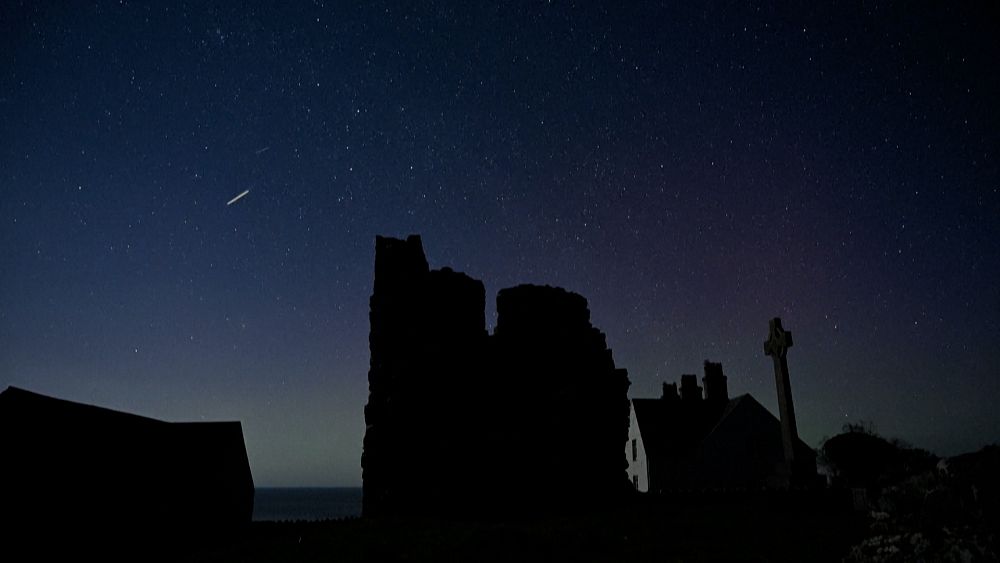
A tiny Welsh island has just won world stargazing fame. Ynys Enlli – a rugged outcrop off the mainland of northwest Wales – has become Europe’s first ‘Dark Skies Sanctuary’.
It is one of only 17 places around the world to achieve global recognition for their ultra-low light pollution and peerless stargazing, joining the likes of Aotea in New Zealand and remote atolls in the South Pacific.
A mountain blocks glare from the mainland, so the only artificial light is the faint glow of Dublin across the Irish Sea.
Enlli’s newfound fame has thrilled the surrounding community. The island itself has just two permanent residents, and they’re both over the moon.
Mari Huws, 30, and her partner Emyr Owen, 36, have spent four years living on Enlli – known in English as Bardsey – as its resident wardens.
“We’re chuffed – it’s momentous for the island,” says Huws, who spearheaded the bid for the designation by the International Dark Sky Association.
Stargazers are rushing to Enlli
People on the nearby Llyn peninsula in northwest Wales, around four hours’ drive from Cardiff, have long known their skies are special. Now, they have a chance to tell the world.
In the town of Pwllheli, the outdoor equipment shop is stocking up on heavy-duty telescopes.
“It’s put Ynys Enlli on the map,” says Caroline Jones, administrator for the Bardsey Island Trust, which manages the site.
“Now the secret’s out, people just want to know more.”
Jones has had to fire off a template response to field a flood of emails from eager stargazers.
In the meantime, amateur astronomers have been taking up position on the highest point overlooking the island, hoping to get as close as they can.
As light pollution skyrockets in towns and cities around the world, clear skies are becoming rarer and more sought-after.
But there’s little chance tourists will overwhelm Enlli.
Numbers are limited on the island, which is around half the size of New York’s Central Park, and its 10 holiday cottages are already fully booked this season.
How has Enlli kept its skies clear?
Enlli’s clear skies aren’t just a boon for human sky-watchers.
Nocturnal Manx shearwaters make their nests on the island, relying on its intense darkness for protection. Recent evidence suggests that puffins are settling into its remarkable birdlife too.
The sanctuary status is constantly reviewed, and the wardens do everything they can to keep light pollution down. They use sensors to switch off bulbs during the day, and the lighthouse is fitted with red LEDs which keep interference to a minimum.
Once a month, when the moon is at its darkest, Huws wakes up in the middle of the night and points a gadget at the heavens to measure the quality of the night sky.
Keeping hold of the sanctuary badge is vital for protecting the island’s nature and environment.
There are several other dark sky reserves in Wales, but the stricter sanctuary status comes with extra emphasis on boosting awareness and long-term conservation.
By spreading the news about the island’s skies, “we can protect something fragile and truly valuable for the future”, Huws says. “When the sky is dark enough, you can see the whole universe above your head.”
Where else can you go stargazing in Europe?

Though nowhere else in Europe yet rivals the Welsh island’s pure skies, there are many other places with excellent conditions for stargazing.
The International Dark Sky Association also certifies Dark Sky Parks; publicly- or privately-owned spaces protected for natural conservation that welcome star-seeking visitors. There are 20 of these dotted around Europe:
- Albanyà (Spain)
- Bodmin Moor Dark Sky Landscape (England)
- Bükk National Park (Hungary)
- De Boschplaat (Netherlands)
- Eifel National Park (Germany)
- Elan Valley Estate (Wales)
- Galloway Forest Park (Scotland)
- Hortobágy National Park (Hungary)
- Lauwersmeer National Park (Netherlands)
- Mayo Dark Sky Park (Ireland)
- Møn and Nyord (Denmark)
- Naturpark Attersee-Traunsee (Austria)
- Northumberland National Park and Kielder Water and Forest Park (England)
- OM Dark Sky Park & Observatory (Northern Ireland)
- Petrova Gora-Biljeg (Croatia)
- Tomintoul and Glenlivet – Cairngorms (Scotland)
- Vrani kamen (Croatia)
- West Penwith (England)
- Winklmoosalm (Germany)
- Zselic National Landscape Protection Area (Hungary)
A further 14 European International Dark Sky Reserves, with sensational starry nights, can be found here.
Watch the video above to see what makes Ynys Enlli so special.
Video editor • Joanna Adhem

